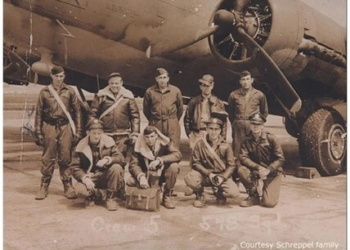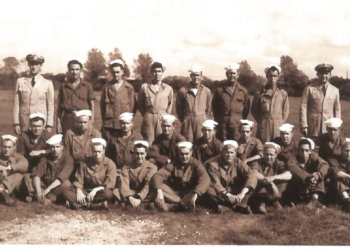Veteran Chris Molina’s days look much different from when he was on active duty with the Marines. The stay-at-home dad is a self-described leadership enthusiast who has spent the last few years speaking at college campuses, running a podcast, and more recently, publishing a book tailored to veterans.
Molina grew up in the town of East Chicago, Indiana. He enlisted in the Marine Corps immediately after high school and spent seven years on active duty in supply administration and operations.
His initial plan, he said, was to make a 20-year career in the military. Unfortunately, a knee injury in his sixth year of service forced a change of plans.
Following the end of his service, Molina attended Purdue University where he majored in management and minored in philosophy. His degree landed him a job with John Deere in the company’s supply management development program. He left that job two–and–a–half–years later to pursue an opportunity to inspire veterans in the civilian sector.
“Honestly, they’re [John Deere] a phenomenal company and I tell people I kind of wish they had treated me poorly because that would have made my decision very easy,” Molina said. “But I left because I found my passion.”

That passion is helping people become better leaders and better professionals; something he talks about at length in his book.
He was inspired to publish “I’m in a Leadership Role, Now What?” because of two problems he’s seen among college students and would-be leaders as he’s conducted his podcast and participated in various speaking engagements.
The first problem, he says, is ambitious college students and graduates are being told they need to differentiate themselves, but they don’t know how. He said the short answer to that problem is they need to seek out leadership roles. Even then, he adds, they are often unprepared.
“No one is telling these college students how to lead when they first get that first leadership role and because they’re not taught how to lead they’re shooting from the hip,” Molina said. “They’re getting bad habits, and they’re also getting a bad taste in their mouths because as we all know, anybody that’s been in a leadership role, it’s not easy.”
The second problem happens a few years after students graduate when they get their first supervisor roles.
“They get their first leadership role where they’re a manager and they’re managing people. And that is when they start buying books on leadership, that’s when they start going to leadership seminars and conferences and that’s a problem because, why we wait that late to start teaching leadership to the managers and supervisors in our entire society is beyond me, and that’s something I’m trying to change. And those two things are the reasons why I speak to an audience, whether its college students or seasoned professionals, and I ask the question ‘please raise your hand if you’ve ever had a crappy boss in your life’. Everybody raises their hands and it doesn’t need to be that way,” he explained.
He said in the military, people are taught about leadership traits and principles. They’re exposed to people demonstrating leadership every day. But in college, students don’t always receive that kind of exposure.
He suggests college students try to take the lead on classroom projects or through part–time jobs.
“You might not be able to get into the leadership role but there are small opportunities always to take a leadership stance on something and just to take charge of a little project here or there,” he said.

Another suggestion he had, not just for younger students but also for transitioning student veterans was to get involved in campus organizations.
“There are so many student organizations and if there aren’t, because your campus is small, you can bring student organizations to your campus,” he said. “They’re always trying to expand so if you find one that you want to be on your campus you can bring it there or you can create your own.”
He said these organizations offer many leadership roles for students as well as a “safe place to fail.” He added these safe places to fail are advantageous for transitioning service members who may need to relearn some of their leadership skills.
“One thing that I’m trying to articulate that our transitioning veterans need to get over is that ego that comes with us having had life experience and having leadership experience,” he said. “So one thing that we pride ourselves on in the military is being really good at leadership. We’ve had tons of experience in it and so whenever we transition to the civilian world we think that’s naturally something that we’re going to be good at. Sometimes we are and sometimes we’re not because we try to apply the same military leadership that we had into the civilian world and it’s different. So this stage of our transition, being on college campuses, is a perfect opportunity to practice that leadership.”
Molina adds only 1% of Americans have served in the military since 2001 and reminds transitioning service members they are the ones who need to adapt, both on campus and in their new careers.
“It’s not up to the 99% of the population to understand you and to adapt to you. It’s up to us, the 1% to adapt to them,” Molina said. “When we’re at school we can look at other student leaders and become student leaders ourselves and practice those skills while we’re at college.”
In addition to his own book, Molina recommends those with an interest in leadership to read “The Seven Habits of Highly Effective People” and “How to Win Friends and Influence People.” The former was written in 1989. The latter was written in 1936. Both are still in print for good reasons Molina said.
“People are still reading those books today. They each have tens of millions of books sold. And why is that?” Molina asked. “It’s because they teach the foundation of leadership and communication for the civilian world. So for any veterans that are out there, those are two classics that all successful professionals have read, and they practice.”







































